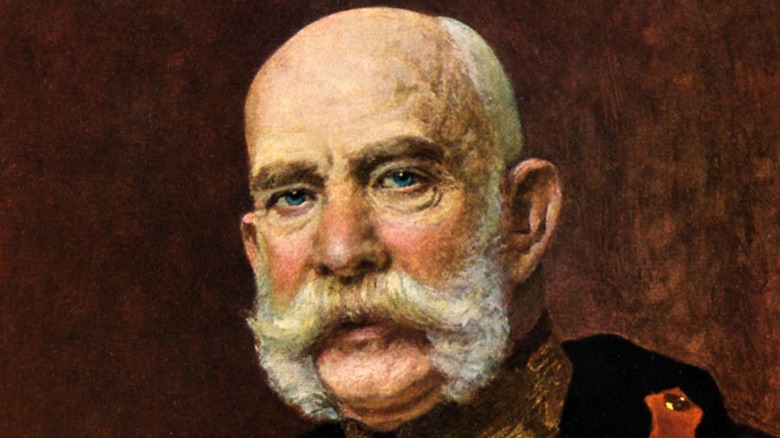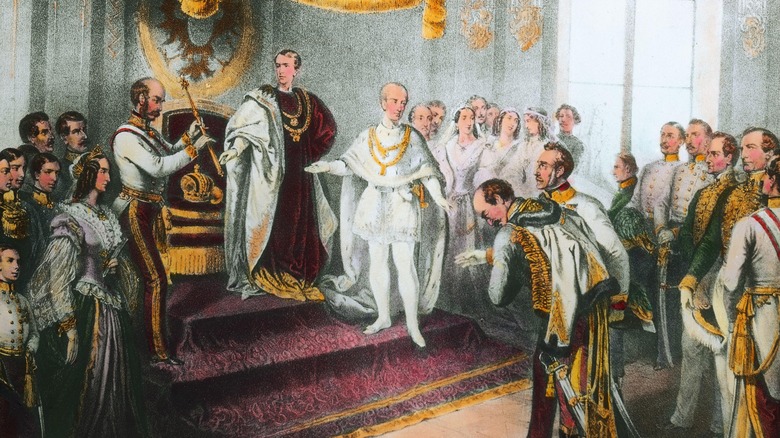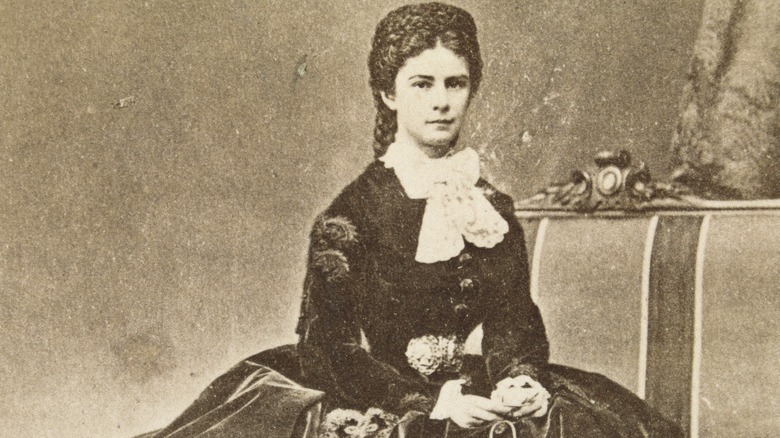The Tragic Story Of Emperor Franz Joseph I
Emperor Franz Joseph I rose to power when he was only a teenager. He was the latest ruler from the powerful royal family known as the house of Habsburg. The youthful leader began his reign on December 2, 1848, after his uncle Emperor Ferinand I abdicated the throne (via Britannica). Ferdinand stepped down in favor of his nephew because of public opposition to his government's policies in the Revolution of 1848. Franz Joseph was the oldest son of Ferdinand's brother, Archduke Franz Karl and Archduchess Sophie, and he had grown up knowing that he would one day become emperor as Ferdinand had no children of his own, according to The World of the Habsburgs.
To prepare him for his future role, Franz Joseph had an intense education focused on learning many languages. He studied German, French, Czech, and Hungarian, as well as Greek and Latin. Franz Joseph also had a lot of physical training, from dancing to riding to fencing. Emphasis was also placed on military tactics and strategies. In fact, Franz Joseph received his first military title, colonel-in-chief of the 3rd Dragoons, when he was only 13 years old.
Troubled times for Emperor Franz Joseph I
There was so much confidence in Franz Joseph's ability to lead that his own father stepped aside to allow him to become emperor of Austria and the other royal holdings. But the early years didn't go too smoothly. Many of his people resented the strict style of government and the creation of an oppressive policing agency. He also had a number of foreign relations missteps. He turned to Russia for help in silencing a Hungarian rebellion in 1849, but then he failed to support his own ally in the Crimean War (via Britannica).
In 1853, an assassin, seeking to avenge the Hungarian revolutionaries, tried to kill Franz Joseph in Vienna. He managed to escape relatively unharmed, and the would-be assassin was executed (via The World of the Habsburgs). Franz Joseph suffered more setbacks over the next few decades, losing control over his Italian territories, Lombardy and Venetia. He also had to face the threat of his new powerful neighbor, the unified German states, in the early 1870s.
Emperor Franz Joseph I had many family misfortunes
In addition to his foreign policy problems, Franz Joseph had a troubled and turbulent personal life. He married Duchess Elizabeth of Bavaria in 1854 (via Britannica). Known as "Sisi," the new queen was only 16 years old at the time of the wedding, and the shy bride wasn't a fan of all the public attention (via History). The couple had three children during the early years of their marriage, two of whom lived to adulthood.
Franz Joseph remained in Vienna's Hofburg Palace while Sisi tried to stay away from the royal residence as much as she could after suffering a nervous breakdown in 1862. Relations between the two royals improved for a time after Franz Joseph became King of Hungary in 1867 and Sisi became queen. They welcomed their last child, daughter Marie Valerie, in 1868. But by the 1880s, Franz Joseph worried about Sisi's state of mind as his wife often spoke of harming herself. The couple was dealt a terrible blow in 1889 by the death of their son Prince Rudolf. The bodies of the prince and his mistress were found at a royal hunting lodge known as Mayerling. The official report claimed that the prince first shot his mistress and then turned the gun on himself, but others have questioned this conclusion. And some have even speculated that the pair had been murdered by a third party (via Virtual Vienna).
Emperor Franz Joseph I paved the way for World War I
Franz Joseph and Sisi were likely devastated by the loss of their son. Sisi, already emotionally fragile, fell into despair and took to traveling to ease her grief (via History). She soon found herself in the wrong place at the wrong time. On September 10, 1898, Sisi was in Geneva, Switzerland. She became the target of Luigi Lucheni, an Italian anarchist who originally planned on killing Prince Henri of Orléans. He learned that the empress was in town and tracked her down. Lucheni stabbed her with a file, and she later died because of internal bleeding. Within the span of months, Franz Joseph had lost his only son and the love of his life.
Despite these family tragedies, Franz Joseph remained a conservative ruler who sought to maintain peace (via Britannica). But that didn't prevent him from adding Bosnia-Herzegovina to the Habsburg Empire in 1908 (via The World of the Habsburgs). This move upset the Ottoman Empire and Serbia, and, with Germany as one of his only allies, Franz Joseph was again in a foreign policy pickle. Rising tensions with Serbia exploded with the assassination of Franz Joseph's nephew, Archduke Franz Ferdinand, who had been selected to be heir to the throne. The emperor went to war with Serbia, the country he blamed for his nephew's death. This marked the beginning of World War I. Franz Joseph didn't live to see the end of the conflict he helped start, dying of pneumonia on November 21, 1916.



